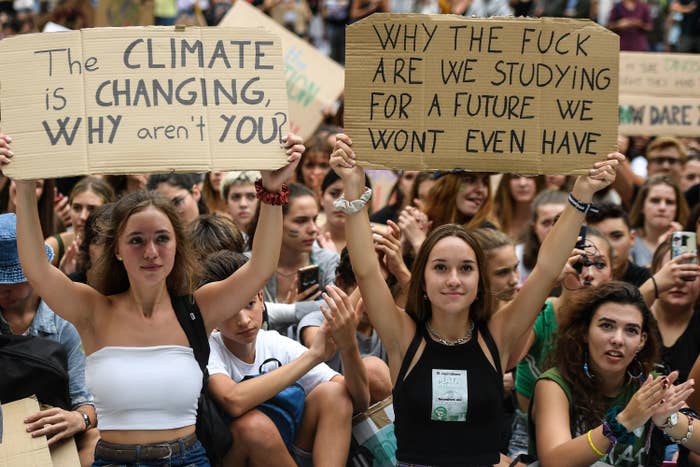
After surviving the Marjory Stoneman Douglas High School shooting, Alfonso Calderon became a gun control activist. Gavin Grimm, whose high school barred him from using the boys' restroom, became a brilliant transgender rights advocate. In the summer of 2017, four teenagers founded Zero Hour, a national climate movement.
These are just a few of the millions of informed and powerful activists who were changing history at age 16. They’ve addressed the United Nations, prepared Supreme Court cases, transformed schools and communities, and challenged corporations and policymakers at every level of government.
One thing they couldn’t do is vote. And it’s time to change that.
In most states, 16-year-olds have the right to drive. They can get married, join a trade union, leave school and work full-time, pay income taxes, earn a minimum wage, leave home without their parents’ consent, pilot a glider, captain a boat, be a lifeguard, consent to medical treatment, get a passport, and take college prep exams that most adults would perform poorly on.
And while studies show they demonstrate the same level of understanding of civics that 21 years olds have, they don’t have a say in who runs their communities and country — even though they’re the ones who will live with the consequences of decisions being made right now about climate, conflict, and spending.
And it’s not just the long-term consequences. Thousands of teenagers suffer in much more immediate ways from laws that were passed without their representation.
Kalief Browder was just 16 when he was incarcerated at Rikers Island in 2009 for the (unfounded) accusation of stealing a backpack at school. He was held there without trial for three years and later died by suicide. Shouldn’t he have had a say in the policies that put him behind bars?
A growing movement says yes — and in a few places, they've succeeded.
In 2013, Takoma Park, Maryland, became the first town to allow 16- and 17-year-olds to vote in local elections. Jesse Broad-Cavanagh was among the first 16-year-olds in the nation to vote when he cast his ballot in Takoma Park that election day. “It was an exciting opportunity to show we could be part of the community,” he told us. “I’ve voted in every election since.”
Two other Maryland municipalities, Hyattsville and Greenbelt, followed suit, and Berkeley, California, also passed a ballot initiative lowering the voting age for some local elections. More recently, Washington, DC, proposed lowering the voting age for local and federal elections. While the measure was suspended by the city council, it will likely be considered again.
At the state level, Massachusetts and Oregon are each considering lowering their voting age for state elections to 16. And a third of states already allow those who are 17 but will be 18 by the next general election to vote in all primaries. Even more allow these 17-year-olds to vote in presidential primaries and caucuses.
Studies show that voting is a habit. When voters vote the first year they are eligible, they are more likely to vote in every election in the future. Further, the research shows that 16-year-olds are more likely to vote than 18-year-olds. Vote16USA, a voting rights organization, cites these reasons and others to argue that it’s time for Congress to give these young people a voice at the federal level.
And they have some support on Capitol Hill.
This year, Democratic Rep. Ayanna Pressley of Massachusetts introduced an amendment to HR 1, the For the People Act, to lower the federal voting age to 16. “Our young people are at the forefront of some of the most existential crises facing our communities and our society at large,” she said in a statement. “I believe that those who will inherit the nation we design here in Congress by virtue of our policies and authority should have a say in who represents them.”
Her amendment failed, but this wouldn’t have been the first time that we’ve lowered our federal voting age. In the 1970s, the 26th Amendment lowered the voting age for all elections from 21 to 18.
There’s ample precedent on the international stage, too. As of 2017, the voting age was 16 in Brazil, Ecuador, Argentina, Nicaragua, Austria, and Scotland. Notably, Austria combined its lower voting age with an increase in civics education in high schools and experienced a higher first-time voter turnout than occurred when the voting age was 18. This is a promising model for the US.
In both the 2016 presidential and 2018 midterm elections, generations younger than Baby Boomers composed the largest segment of voters. Today’s youth are online, up to date, in the street, and on point with their facts and figures.
They are ready. They need the vote. A better future for all of us depends on it.
Karen Dolan directs the Criminalization of Race and Poverty Project at the Institute for Policy Studies. Theo Wuest is a Next Leader at the Institute for Policy Studies.
CORRECTION
This op-ed was written by Karen Dolan and Theo Wuest. Due to a publishing error, Tom Gara, the opinion editor for BuzzFeed News, was mistakenly listed as an author.

